De Amerikaanse schrijver John Fante werd geboren in Colorado op 8 april 1909. Zie ook alle tags voor John Fante op dit blog.
Uit: Ask the Dust
“Then I went down the hill on Olive Street, past the horrible frame houses reeking with murder stories, and on down Olive to the Philharmonic Auditorium, and I remembered how I’d gone there with Helen to listen to the Don Cossack Choral Group, and how I got bored and we had a fight because of it, and I remembered what Helen wore that day — a white dress, and how it made me sing at the loins when I touched it. Oh that Helen — but not here.
And so I was down on Fifth and Olive, where the big street cars chewed your ears with their noise, and the smell of gasoline made the sight of the palm trees seem sad, and the black pavement still wet from the fog of the night before.
So now I was in front of the Biltmore Hotel, walking along the line of yellow cabs, with all the cab drivers asleep except the driver near the main door, and I wondered about these fellows and their fund of information, and I remembered the time Ross and I got an address from one of them, how he leered salaciously and then took us to Temple Street, of all places, and whom did we see but two very unattractive ones, and Ross went all the way, but I sat in the parlor and played the phonograph and was scared and lonely.
I was passing the doorman of the Biltmore, and I hated him at once, with his yellow braids and six feet of height and all that dignity, and now a black automobile drove to the curb, and a man got out. He looked rich; and then a woman got out, and she was beautiful, her fur was silver fox, and she was a song across the sidewalk and inside the swinging doors, and I thought oh boy for a little of that, just a day and a night of that, and she was a dream as I walked along, her perfume still in the wet morning air.
Then a great deal of time passed as I stood in front of a pipe shop and looked, and the whole world faded except that window and I stood and smoked them all, and saw myself a great author with that natty Italian briar, and a cane, stepping out of a big black car, and she was there too, proud as hell of me, the lady in the silver fox fur. We registered and then we had cocktails and then we danced awhile, and then we had another cocktail and I recited some lines from Sanskrit, and the world was so wonderful, because every two minutes some gorgeous one gazed at me, the great author, and nothing would do but I had to autograph her menu, and the silver fox girl was very jealous.”
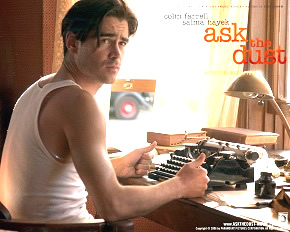
John Fante (8 april 1909 – 8 mei 1983)
Affiche voor de film uit 2006 met o.a. Colin Farrell (Arturo)
De Duitse dichter Johann Christian Günther werd geboren op 8 april 1695 in Striegau. Zie ook mijn blog van 8 april 2007. Zie ook alle tags voor Johann Christian Günther op dit blog.
Was war das fuer ein goettlich Paar?
Was war das für ein göttlich Paar?
Wo hat die Welt dergleichen Lüste?
So lacht’ ihr Mund, so flog das Haar,
So hüpften die gefüllten Brüste.
Die Sehnsucht schilt den leeren Raum,
Ich weiß nicht, was ich selbst begehre.
Der Menschen Leben heißt ein Traum,
O wenn doch meins ein solcher wäre!
An die Spötter seiner Poesie
Ist Damon nicht ein fauler Thor?
So sprechen viel der reichen Brüder,
Er bringt kein großes Werck hervor,
Und was er macht, das sind nur Lieder;
Er scherzt mit Gärthen, Kuß und Hayn,
Will ruhig und verborgen seyn
Und weder Schaz noch Staat erwerben;
Sagt, ist wohl Damon weis und klug?
Ihr Narren, thut er nicht genug?
Er lernt ja leben und auch sterben.
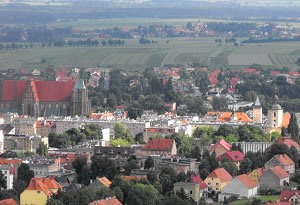
Johann Christian Günther (8 april 1695 – 15 maart 1723)
Striegau (tegenwoordig Pools Strzegom)
De Amerikaanse schrijver Glendon Fred Swarthout werd geboren op 8 april 1818 in Pinckney, Michigan. Zie ook alle tags voor Glendon Swarthout op dit blog.
Uit: The Shootist
„Claw Hand waggled his gun in warning. “I am not armed,” the rider assured him. “You be careful of that cannon.” Slipping the wallet from inside his coat, he tossed it. The old man let his eyes follow and therefore did not see the weapon which appeared in the rider’s hand as suddenly as blown sand, nor did he hear the explosion because the bullet exploded in his abdomen, crazed through his vitals, was deflected by the spine, and lodged, spent, in the socket of his left hip. He dropped his gun and fell to his knees and squealed like a stuck pig.
“Gawdamighty, you’ve murdered me!”
“Bring me the wallet.”
“I cain’t! Gawdamighty!”
“Bring it you old bastard, or I will put another through the same hole.”
The man’s claw pecked at it, his good hand stopped his stomach as though it were a barrel with the bung out, and blubbering, staggering to the horseman, he handed up the wallet.
“Thanks,” said the rider, putting away wallet and weapon and taking reins.
“You ain’t a-going to leave me here!”
“I am.” The rider considered him. “I will do you a favor, though. You have got a bellyache you are not going to get over. You can die slow or now. If you like, I will kill you.”
“Kill me!”
“If I was in your fix, I would be obliged. I am a fair shot, and you are old enough, and you don’t look as if life has treated you very sporting.”
Claw Hand backed off and sank to his knees again and began to wail like a child. His mouth hung open in shock. Saliva dripped from his chin.
“Suit yourself,” said the man on the crimson pillow, turning as he rode on. “Don’t try to hold up anybody else before you die, Granddad. You are not worth a damn at it.”
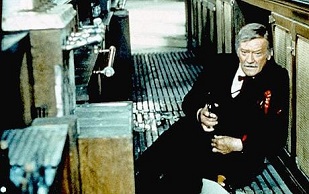
Glendon Swarthout (8 april 1918 – 23 september 1992)
Scene uit de film met John Wayne, 1976
De Duitse schrijver Martin Grzimek werd geboren op 8 april 1950 in Trutzhain, Hessen. Zie ook alle tags voor Martin Grzimek op dit blog.
Uit: Tristan
“Es geschah am Morgen des siebzehnten Ianuarius auf dem Schlachtfeld nicht weit der normannischen Küste in den Hügeln bei Convuë. Riwalin, König von Parmenien, wurde von Fürst Morgan, seinem eigenen irischstämmigen Lehnsmann, durch einen gewaltigen Schwerthieb tödlich getroffen. Riwalin war dicht an Morgan herangeritten und wollte gerade zum Schlag ausholen, als sich
Morgans Pferd plötzlich wie eine Furie um sich selbst drehte, und im Schwung dieser Drehung hatte der Irländer, unvorhersehbar auf der anderen Seite neben dem König auftauchend, das Schwert gegen dessen Hals prallen lassen. Es durchtrennte die Maschen des Kettenhemds knapp über der Schulter, rutschte durch die Wucht der Bewegung zum Kinn Riwalins hinauf und schlitzte ihm die Halsader auf. Riwalin riss noch den Kopf herum, suchte den Feind, der ihn angegriffen hatte, erblickte Morgan und wollte schreien – da brach das Licht in des jungen Königs Augen, und das Blut, das ihm über die Brust rann, löschte das Feuer seines Zorns. Tot sank er vom Pferd.
Nur einen halben Tagesritt entfernt auf der Burg Canoêl rang am selben Abend Blancheflur, Riwalins Frau und zugleich die Schwester von König Marke aus Cornwall in Britannien, mit dem Tod, um ihrem Kind, das einst und für alle Zeiten Tristan genannt werden sollte, ein ewiges Leben zu schenken. Die Tücher, in denen der Neugeborene seinen ersten Schrei ausstieß, waren noch voll von Blancheflurs Schweiß, von den Krämpfen ihres Todeskampfes, vom Glück ihrer Liebe. Floräte, die Frau Ruals, des Marschalls von Parmenien, und Elbeth, die Amme, bargen das Kind. Und während Floräte Blancheflur mit den zitternden Stößen ihrer angstvollen Atemzüge in den Tod weinte, wusch die Amme den
Säugling und befreite ihn von Schleim und Blut. Sie wusch ihn mit ihren Tränen, während Floräte ihr Gesicht an der noch warmen, schweißnassen Brust der Toten verbarg. Alles war ein einziger Schmerz, ein Klagen mit aufeinander-gepressten Lippen. Denn niemand durfte etwas von diesem Unglück erfahren.
Und als Floräte aufschaute, wagte sie es, ihre glühende Wange für einen Augenblick an die der Toten zu drücken, ihre Hände um das schöne Gesicht ihrer Königin zu legen und ihr die Augen zu schließen, in denen ein Licht von innen her zu leuchten schien, bis es im erstarrten Blick verglomm.“
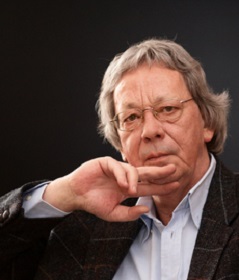
Martin Grzimek (Trutzhain, 8 april 1950)
De Franse dichter en schrijver Hégésippe Moreau (eig. Pierre-Jacques Roulliot) werd geboren op 8 april 1810 in Parijs. Zie ook alle tags voor Hégésippe Moreau op dit blog.
Souvenirs d’enfance
Après dix ans je vous revois,
Vous que j’aimai toute petite ;
Oui, voilà bien les yeux, la voix
Et le bon cœur de Marguerite.
Vous m’avez dit : « Rajeunissons
Ces souvenirs pleins d’innocence. »
Ah ! j’y consens, recommençons
Un des beaux jours de notre enfance.
Comme ils sont loin ces jours si beaux !
Gais enfants que le jeu rassemble,
En souliers fins, en gros sabots,
Sur l’herbe nous courions ensemble.
Dans la vie, où nous avançons,
Nous ne marchons plus qu’à distance.
Ah ! j’y consens, recommençons
Un des beaux jours de notre enfance.
Pauvre ignorant, vous m’instruisiez
Avec une peine infinie ;
Plus d’une fois, lorsqu’à vos pieds
J’épelais Paul et Virginie,
Je fus distrait à vos leçons,
Pour y rester en pénitence :
Ah ! j’y consens, recommençons
Un des beaux jours de notre enfance.
Quoi ! je chante et pas un souris,
Pas un regard qui m’applaudisse !
Autrefois, quand je vous appris
L’air dont m’a bercé ma nourrice,
Un baiser fut de mes chansons
Le refrain et la récompense :
Ah ! j’y consens, recommençons
Un des beaux jours de notre enfance.
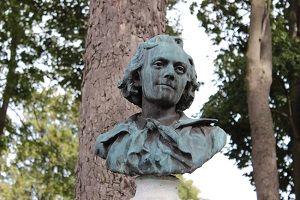
Hégésippe Moreau (8 april 1810 – 20 december 1838)
Borstbeeld op Montparnasse, Parijs
